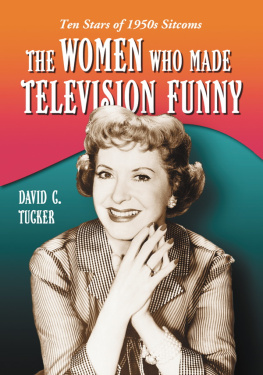The Greatest Sitcoms of All Time
Martin Gitlin

THE SCARECROW PRESS, INC.
Lanham Toronto Plymouth, UK
2014
Published by Scarecrow Press, Inc.
A wholly owned subsidiary of The Rowman & Littlefield Publishing Group, Inc.
4501 Forbes Boulevard, Suite 200, Lanham, Maryland 20706
www.rowman.com
10 Thornbury Road, Plymouth PL6 7PP, United Kingdom
Copyright 2014 by Scarecrow Press, Inc.
All rights reserved . No part of this book may be reproduced in any form or by any electronic or mechanical means, including information storage and retrieval systems, without written permission from the publisher, except by a reviewer who may quote passages in a review.
British Library Cataloguing in Publication Information Available
Library of Congress Cataloging-in-Publication Data
Gitlin, Marty.
The greatest sitcoms of all time / Martin Gitlin.
pages cm
Includes bibliographical references and index.
ISBN 978-0-8108-8724-4 (cloth : alk. paper) ISBN 978-0-8108-8725-1 (ebook) 1. Situation comedies (Television programs)United States. I. Title.
PN1992.8.C66G58 2014
791.45'617dc23 2013023335
 The paper used in this publication meets the minimum requirements of American National Standard for Information SciencesPermanence of Paper for Printed Library Materials, ANSI/NISO Z39.48-1992.
The paper used in this publication meets the minimum requirements of American National Standard for Information SciencesPermanence of Paper for Printed Library Materials, ANSI/NISO Z39.48-1992.
Printed in the United States of America.
Introduction
Rating sitcoms is not like comparing apples to oranges. It is far more complicated. It is like comparing apples to hamburgers to asparagus to mashed potatoes. That is how vast the differences can be between one television comedy and another. But I figured what the heck, lets give it a shot. Why? Because it was going to be tremendous fun, and a ranking of the best had yet to be attempted in book form. It was understood that television viewers feel passionate about their favorites and that heated discussions would result. But good-natured debate is one of the spices of life.
The task was indeed overwhelming because of the various factors that influenced the writing, production, performance, and success of sitcoms from 1950 to the present. The green light hoisted by All in the Family to social and political themes in the early 1970s launched a new era in the genre. Every sitcom that came before it had to be judged by the unspoken limitations placed upon them in regard to comedic fodder. For example, Will & Grace cannot be examined in the same light as Leave It to Beaver , yet both were breakthrough shows, the latter for its primary spotlight on youth and the former for its focus on gay characters. The ranking of each program listed in this book had the era in which it aired taken into strong consideration. Individual rankings were based on the following factors, all of which were taken with many grains of salt:
Impact: Shows that made an impression on the direction of television comedy or the society in which we live or merely explored new territory were rare. They took chances, which is certainly important. But I was particularly careful not to place too much emphasis on this category. After all, forays into uncharted waters were virtually impossible for shows in the 1950s and 1960s, which were hamstrung by the restraints of their times. It would be unfair to punish them for something they could not control. And those who created other shows had no intention of making a statement. It can certainly be argued that they, too, are not to blame for creating shows with the sole purpose of making viewers laugh. The number one choice is a prime example (you dont think I was going to give that away in the introduction, do you?).
Longevity: As the great Martin Luther King Jr. once famously said about a topic far more important (his own mortality), longevity has its place. It does in the world of television comedy. The ability of producers, directors, writers, and actors to maintain viability and viewership for long periods of time cannot be underrated. But it is foolish to give that too much credence. There are sitcoms that earned spots on this list that lasted two seasons or less, and others never considered to have longevity approached a decade on the air. Longevity does not always translate to greatness.
Ratings: Although this category ties in with longevity, they are not identical. Some shows ( The Adventures of Ozzie and Harriett immediately comes to mind) remained on television for ten years or longer without garnering ratings worthy of sticking around that long. Other shows earned tremendous Nielsens but were panned by the critics and unworthy of selection. Most often this was a credible reflection on the worthiness of a sitcom, but popularity does not always translate to greatness in any form of entertainment.
Awards: Emmys and Golden Globes were strongly considered in the rankings, although one must be careful to prevent linking them with surefire greatness, particularly in the 1950s and 1960s, when there were fewer awards to go around and some of the most watched, beloved, and generally respected sitcoms were shut out. Those accepted as the premier shows in television history, however, were generously awarded, and that was reflected in the rankings, particularly at the upper levels.
Humor: This is certainly the most subjective of the considerations, but not wholly. Not everything in entertainment is subjective. The Beatles were a better band than The Bay City Rollers. Period. And Seinfeld was a better sitcom than The Ropers . Period. The talent in production, direction, writing, and comedic performance can be judged objectively. And some shows simply elicited more laughs than others. On the other hand, there is no doubt that subjective opinion enters strongly into the equation when ranking the seventy best sitcoms. It is a difficult task. And subjectivity was certainly a factor when I was separating (for instance) number forty-seven from number forty-eight. Debate away.
Legacy: How shows of the past are respected or disrespected by later generations through syndication and reputation was factored into the rankings. Many old sitcoms, like The Honeymooners , are far more respected and popular in the modern era than when they aired, but I was careful not to overrate the importance of this category. Gilligans Island and The Brady Bunch (both Sherwood Schwartz creations) are two examples of sitcoms whose reputations beyond their runs on the airwaves far exceeded their greatness due to their iconic statuses through syndication.
An equally daunting task to ranking the top seventy sitcoms once they were established was deciding which ones to leave out. Some were award winners, many earned high ratings, and still others shine brightly in the spotlight of television history. That is where a healthier mix of subjectivity and objectivity entered into the equation. It was not difficult identifying most of the sitcoms in the book as worthy of inclusion. I flipped no coins in making decisions. I was careful to weigh the aforementioned criteria to determine which sitcoms belonged and which did not. It was the difficulty of that task that motivated me to add a Top 10 list of sitcoms from each decade that fell short. Each deserved the recognition.
I believe you will enjoy reading about the shows that have made us laugh, and sometimes cry. Our favorites have brought joy to our lives. It matters not if they are on this list. They say laughter is the best medicine. Any show that has made a viewer feel better after a miserable day has fulfilled its purpose. Its just that the following sitcoms fulfilled that purpose more successfully than the others. Enjoy!
Next page














 The paper used in this publication meets the minimum requirements of American National Standard for Information SciencesPermanence of Paper for Printed Library Materials, ANSI/NISO Z39.48-1992.
The paper used in this publication meets the minimum requirements of American National Standard for Information SciencesPermanence of Paper for Printed Library Materials, ANSI/NISO Z39.48-1992.